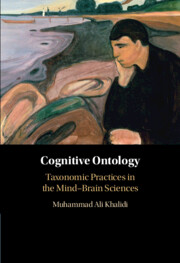Book contents
- Cognitive Ontology
- Cognitive Ontology
- Copyright page
- Dedication
- Contents
- Figures
- Contributors
- Preface
- Chapter 1 Cognitive Kinds
- Chapter 2 Concepts
- Chapter 3 Innateness
- Chapter 4 Domain Specificity
- Chapter 5 Episodic Memory
- Chapter 6 Language-Thought Processes
- Chapter 7 Cognitive Heuristics and Biases
- Chapter 8 Body Dysmorphic Disorder
- Chapter 9 Epilogue
- References
- Index
Chapter 2 - Concepts
Published online by Cambridge University Press: 15 January 2023
- Cognitive Ontology
- Cognitive Ontology
- Copyright page
- Dedication
- Contents
- Figures
- Contributors
- Preface
- Chapter 1 Cognitive Kinds
- Chapter 2 Concepts
- Chapter 3 Innateness
- Chapter 4 Domain Specificity
- Chapter 5 Episodic Memory
- Chapter 6 Language-Thought Processes
- Chapter 7 Cognitive Heuristics and Biases
- Chapter 8 Body Dysmorphic Disorder
- Chapter 9 Epilogue
- References
- Index
Summary
This chapter discusses one of the most basic putative cognitive kinds, concept, arguing that it should be considered a real kind based on our current state of knowledge, contrary to what some philosophers have urged. After surveying empirical work on concepts in cognitive neuroscience and cognitive psychology, the chapter tries to show that this work is pitched at different levels of explanation. Much recent work on concepts using neuroimaging techniques should not be expected to reveal the neural correlates of concepts because the research has different explananda and is investigating different causal processes. Other work on concepts in cognitive science reveals psychological structures (prototypes) associated mainly with automatic processing rather than deliberative reasoning. By contrast, concepts proper can be understood as functional kinds, which are individuated partly etiologically and partly with reference to the thinker’s discriminatory and inferential abilities. Many research programs in cognitive science individuate concepts in this way, combining diachronic and synchronic factors.
Information
- Type
- Chapter
- Information
- Cognitive OntologyTaxonomic Practices in the Mind-Brain Sciences, pp. 33 - 74Publisher: Cambridge University PressPrint publication year: 2023
